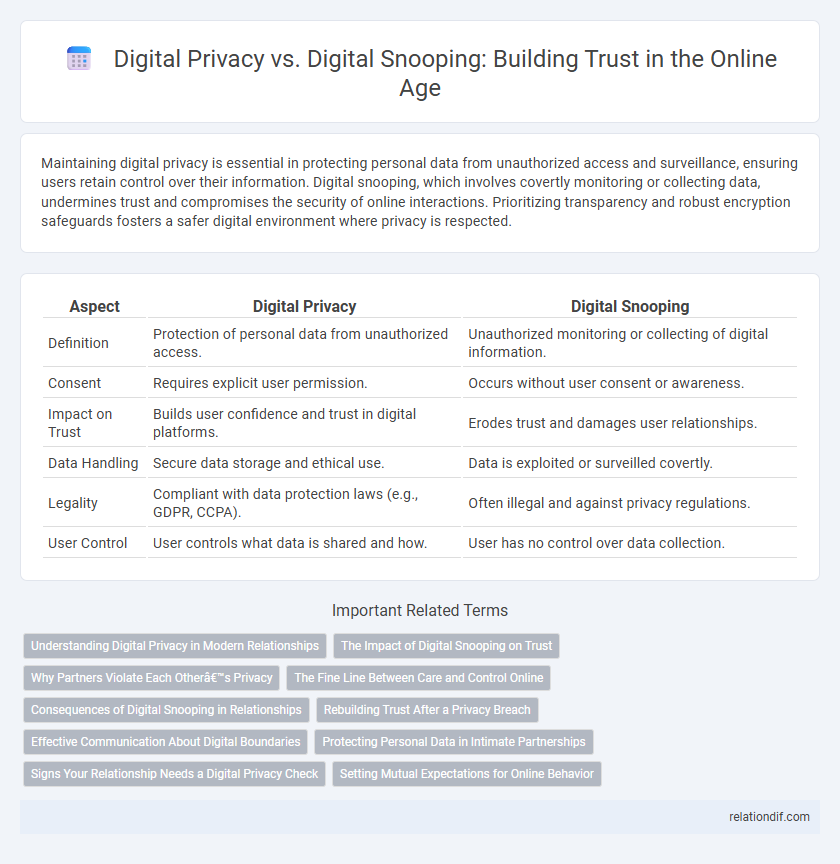Maintaining digital privacy is essential in protecting personal data from unauthorized access and surveillance, ensuring users retain control over their information. Digital snooping, which involves covertly monitoring or collecting data, undermines trust and compromises the security of online interactions. Prioritizing transparency and robust encryption safeguards fosters a safer digital environment where privacy is respected.
Table of Comparison
| Aspect | Digital Privacy | Digital Snooping |
|---|---|---|
| Definition | Protection of personal data from unauthorized access. | Unauthorized monitoring or collecting of digital information. |
| Consent | Requires explicit user permission. | Occurs without user consent or awareness. |
| Impact on Trust | Builds user confidence and trust in digital platforms. | Erodes trust and damages user relationships. |
| Data Handling | Secure data storage and ethical use. | Data is exploited or surveilled covertly. |
| Legality | Compliant with data protection laws (e.g., GDPR, CCPA). | Often illegal and against privacy regulations. |
| User Control | User controls what data is shared and how. | User has no control over data collection. |
Understanding Digital Privacy in Modern Relationships
Digital privacy in modern relationships hinges on mutual respect for personal boundaries and transparent communication about data sharing. Trust is compromised when digital snooping--such as unsolicited access to messages or social media accounts--occurs, undermining emotional security. Establishing clear agreements on privacy expectations strengthens relational trust and supports individual autonomy in the digital age.
The Impact of Digital Snooping on Trust
Digital snooping erodes trust by exposing private information without consent, leading to heightened feelings of vulnerability and suspicion in online interactions. This breach of privacy undermines the foundation of secure communication and creates barriers to open sharing and collaboration. Consequences include reduced user engagement and increased demand for enhanced privacy protections and transparent data practices.
Why Partners Violate Each Other’s Privacy
Partners violate each other's digital privacy due to mistrust, insecurity, and the desire for control within their relationship. Digital snooping often stems from fear of betrayal, leading individuals to monitor messages, social media, and online activity without consent. This behavior damages trust and creates a cycle of suspicion that erodes the foundation of a healthy partnership.
The Fine Line Between Care and Control Online
Digital privacy hinges on individuals maintaining control over their personal data, while digital snooping blurs this boundary by covertly monitoring online activities without consent. Trust deteriorates when protective measures morph into invasive surveillance, undermining user autonomy and freedom. Balancing care and control online requires transparent data practices and reinforced user consent mechanisms that prioritize privacy rights over intrusive monitoring.
Consequences of Digital Snooping in Relationships
Digital snooping in relationships often erodes trust, leading to increased suspicion and emotional distance between partners. Persistent invasion of privacy can result in anxiety, resentment, and ultimately the deterioration of communication and intimacy. Studies show that couples experiencing digital privacy breaches are more likely to face conflicts, decreased satisfaction, and higher rates of relationship dissolution.
Rebuilding Trust After a Privacy Breach
Rebuilding trust after a digital privacy breach requires transparent communication and immediate action to address vulnerabilities. Implementing robust encryption protocols and privacy-focused data management can reassure users about their information security. Consistent updates on security measures and accountability are essential to restore confidence and prevent future digital snooping.
Effective Communication About Digital Boundaries
Clear communication about digital boundaries fosters trust by ensuring all parties understand privacy expectations and data-sharing limits. Establishing explicit guidelines on what information is private versus accessible reduces the risk of digital snooping and reinforces respectful interactions. Effective dialogue empowers individuals to protect their digital privacy while maintaining transparent and trustworthy relationships.
Protecting Personal Data in Intimate Partnerships
Protecting personal data in intimate partnerships is essential for maintaining trust and respecting privacy boundaries. Couples should establish clear agreements about digital access and avoid digital snooping to prevent breaches of confidentiality and emotional harm. Using encrypted communication and secure password practices further strengthens personal data protection, fostering a transparent and trustworthy relationship environment.
Signs Your Relationship Needs a Digital Privacy Check
Frequent secretive phone use, unexplained deletions of messages or browser history, and invasive password demands signal a relationship's digital privacy is compromised. Constant monitoring of social media activity or unauthorized access to devices reflects digital snooping that undermines trust and emotional security. Recognizing these signs early helps couples set healthy boundaries and foster transparency essential for mutual respect.
Setting Mutual Expectations for Online Behavior
Setting mutual expectations for online behavior is essential to establish trust between users and digital platforms, promoting transparency and respect for digital privacy. Clear guidelines on data collection, consent, and acceptable monitoring practices help users understand the scope of digital interactions, reducing concerns about intrusive digital snooping. Emphasizing accountability and communication fosters a balanced environment where privacy rights are protected while enabling legitimate oversight.
Digital Privacy vs Digital Snooping Infographic

 relationdif.com
relationdif.com